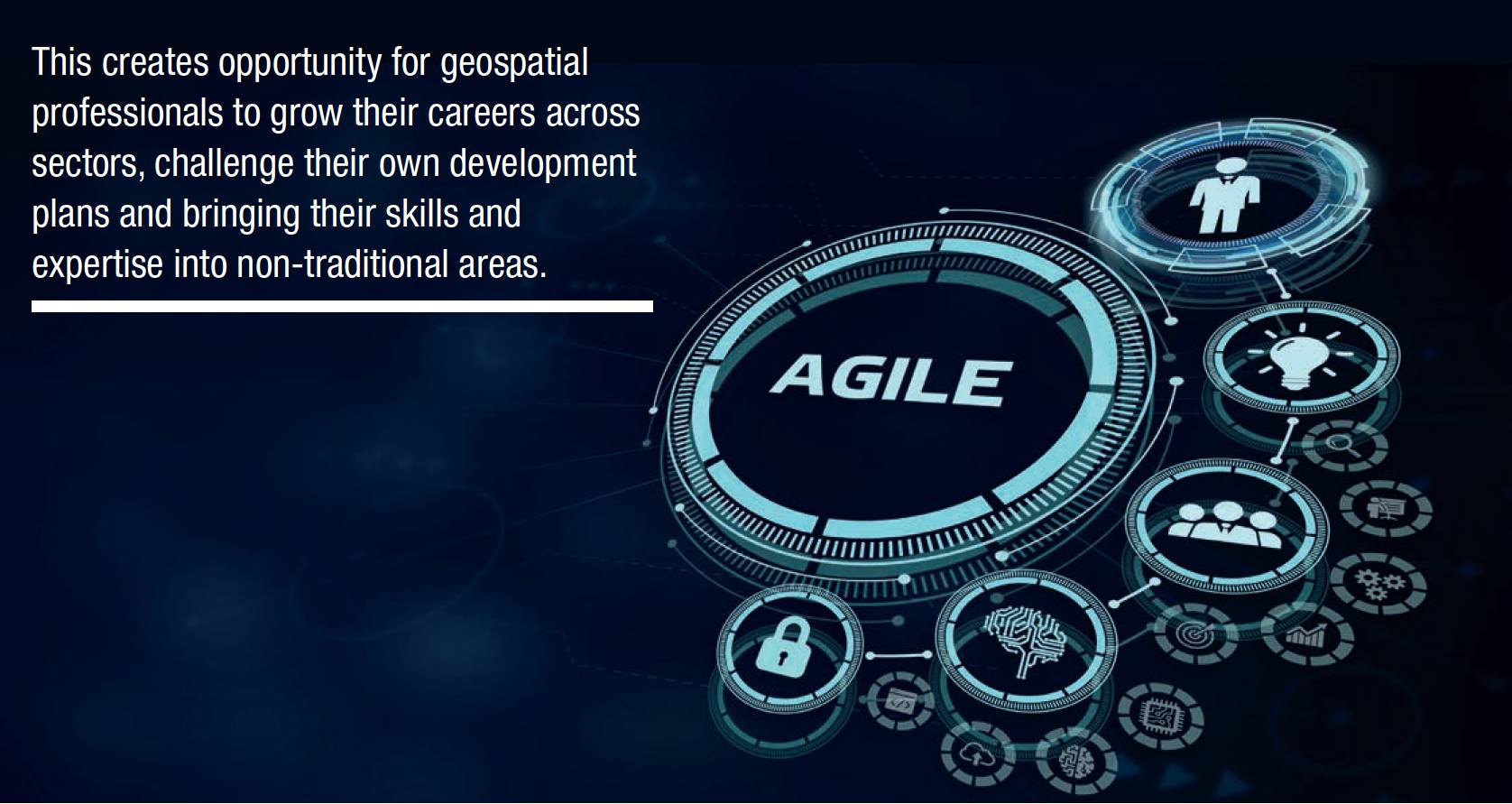Delivering for you
Agile careers and geospatial
Simon Navin MCInstCES, Geospatial Service Lead, Jacobs

CHALLENGING yourself to have an agile approach to your career will ensure you stay motivated, fulfilled and on a path of continuous learning. In today’s world, change is often described as the only constant. Being able to adapt to new situations and challenges is something that is essential for success. Careers are no different. You may have heard the term ‘agile careers’. But what is an agile career and what does it mean for geospatial and location data professionals working in the built and natural environment industries?
Being agile in your career can mean different things to different people. But one thing is common – it means being open to change and adaptability. While this may seem like it can bring risks and instability – it can be quite the opposite, offering individuals the chance to experience new things within one organisation and build a well-rounded set of skills and capabilities, increasing their value to a business and supporting the creation of a diverse talent force.
Adapting and evolving
Rather than following a traditional career path with linear progression, agile careers involve constantly adapting and evolving in response to changing circumstances and opportunities, while being in control of your career direction. This approach to work is gaining popularity as more and more people are seeking flexibility and autonomy in their careers. Multiple careers and career experiences can be had within one organisation or profession, challenging traditional narratives.
While this may seem like it can bring risks and instability – it can be quite the opposite, offering individuals the chance to experience new things within one organisation.
Agile careers also focus on the opportunity to continuously learn. We often hear about upskilling and reskilling to improve career prospects – being agile in your career means that skill development is part of day-to-day development within your organisation. Exposure to new people, projects, systems and challenges will create learning and development opportunities that you may have previously thought were out of reach.
But what can career agility mean to those working in geospatial? What opportunities could an agile approach to your career bring in our industry? And why now? Geospatial technology and services have never been more sought after. As the fusion of location data, insight and technology becomes ever closer, our professional expertise becomes more sought after. Geospatial analysis, insight and services are cross cutting enablers for many disciplines, often providing the last part of the puzzle that ensures stakeholders really understand context, impact and outcomes.
The skills required to produce these insights and outcomes are becoming increasingly more democratised, with the requirement for location data capabilities needed in many sectors. This creates opportunity for geospatial professionals to grow their careers across sectors, challenge their own development plans and bringing their skills and expertise into non-traditional areas.

What could that mean?
Well, your career may be focused on providing for one sector, for example transportation. You can lift all you have learned from working with transportation colleagues and apply it to environmental, nuclear, geoscience, health etc. Each of these industries is trying to solve complex, place-based challenges. Having an agile mindset and being open to learning about new industries and challenges could bring your skills to new customers, stakeholders and colleagues.
Geospatial solutions present a very good way of communicating benefits to the end user or non-technical audiences – displaying outcomes in a map-based context is a great way to bridge an understanding gap. Taking your skills into a new area and telling stories through geospatial data may help you and your customers grow an understanding of what is possible.
The increasing need for simplified location and place-based insight means the mediums of delivery need to continually evolve. Geospatial application development skills are applicable to all industries that need location insight – these transferable skills will create value and connect data and outcomes for your customer, whatever the sector.
Having an agile mindset and being open to learning about new industries and challenges could bring your skills to new customers, stakeholders and colleagues.
Benefits
Agile careers within your organisation create many benefits to you and your employer. From staying engaged in your work, with injections of variety and diversity, to building new networks and collaborations. Challenging yourself to have an agile approach to your career will ensure you stay motivated, fulfilled and on a path of continuous learning.
Employers benefit from creative and innovative thinkers, bringing new experiences and thought processes to other parts of their business.
How receptive to career agility are you or the organisation you work for? Are you challenging yourself or your employer to utilise your skills across all areas the business or in other sectors that may benefit from solving place-based challenges? Rather than follow a predetermined career path, focus on personal growth, continuous learning and adaptability.
Take control of your career direction and choose paths that suit your interests and goals – deliver best value for you, your customers and your organisation, and enjoy more flexibility and autonomy in your work.
Simon Navin MCInstCES, Geospatial Service Lead, Jacobs